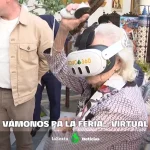

Artificial intelligence, the creation of the coronavirus vaccine or the development of bionic limbs are some of the scientific milestones that have been achieved at some point in history. the Princess of Asturias Award for Scientific and Technical Research. Today it is the turn of Daniel J. Drucker, Jeffrey M. Friedman, Joel F. Habener, Jens Juul Holst and Svetlana Mojsov, who receive the penultimate of the awards of the 2024 edition. This title recognizes the work of the five researchers in having initiated and developed the type 2 diabetes treatment since the seventies of the last century.
“From its different laboratories They studied hormones that intervene in the process and regulate digestive metabolismsuch as somatostatin, which inhibits the production of glucagon and insulin, and variants of glucagon, called GLP-1 and GLP-2, and verified that this homeostasis system could be an effective therapeutic target against type 2 diabetes,” The entity adds. Likewise, it has highlighted the trajectory of each of them:
- Daniel J. Druckerdoctor and professor at University of Toronto, of which he has been a professor since 1996. Among the numerous recognitions with which he has been awarded, the Banting Medal for Scientific Achievement from the American Diabetes Association (2014) stands out; the Rolf Luft Prize from the Karolinska Institute (Sweden, 2017); appointment as Keith Harrison Memorial Lecturer by the Australian Endocrine Society (Australia, 2019); and the Warren Alpert Foundation awards, shared with Jens Juul Holst and Joel F. Habener (United States, 2020), Canada Gairdner International from the Gairdner Foundation (Canada, 2021), Wolf in Medicine (Israel, 2023) and VinFuture in the category Innovators with Outstanding Achievements in Emerging Fields from VinFuture Foundation (Vietnam, 2023).
- Jeffrey M. Friedman, graduated in Medicine, has received, among many others, the International Danone Nutrition Award (Spain, 2007); the awards, shared with Douglas Coleman, Shaw of Life Sciences and Medicine (Hong Kong, China, 2009), Albert Lasker of Basic Medical Research (United States, 2010) and BBVA Foundation Frontiers of Knowledge of Biomedicine (Spain, 2012) ; the King Faisal in Medicine (Saudi Arabia, 2013), the Wolf in Medicine (Israel, 2019) and the Breakthrough in Life Sciences (United States, 2020).
- Joel F. Habener combines research, teaching and clinical activity as a professor of Medicine at Harvard University and director of the Laboratory of Molecular Endocrinology at Massachusetts General Hospital. He has been recognized by the Warren Alpert Foundation Awards, the Gairdner Foundation’s Canada Gairdner International Awards (Canada, 2021), and the VinFuture Foundation’s Innovators with Outstanding Achievements in Emerging Fields category (Vietnam, 2023).
- Jens Juul Holstco-founder of the companies Antag Therapeutics and Bainan Biotech and scientific director of the Novo Nordisk Laboratories Basic Metabolic Research Center, based at the University of Copenhagen. He has recently been awarded the Warren Alpert Foundation, the Canada Gairdner International from the Gairdner Foundation (Canada, 2021), the Banting Medal for Scientific Achievement from the American Diabetes Association (2021), the Novo Nordisk Foundation Lecture from the Novo Nordisk Foundation (Denmark, 2023), the VinFuture in the Innovators with Outstanding Achievements in Emerging Fields category of the VinFuture Foundation (Vietnam, 2023).
- Svetlana Mojsov He studied physics-chemistry in Belgrade and graduated in 1972 from Rockefeller University (USA), where he worked hand in hand with the 1984 Nobel Prize in Chemistry Robert Merrifield and specialized in the synthesis of peptides. At Massachusetts General Hospital identified the GLP-1 peptide, synthesized it and studied its function, in addition to developing antibodies against some of its sequences. In the nineties he returned to Rockefeller University. He has received the VinFuture Awards in the Innovators with Outstanding Achievements in Emerging Fields category from the VinFuture Foundation (Vietnam, 2023) and the Pearl Meister Greengard from The Rockefeller University (United States, 2024).
They join those already awarded in this year’s edition, from Joan Manuel Serrat (Arts) to the Organization of Ibero-American States for Education, Science and Culture (International Cooperation), passing through Ana Blandiana (Letters), Michael Ignatieff (Social Sciences), Carolina Martin (Sports) and Marjane Satrapi (Communication and Humanities). The truth is that, although in recent years they have awarded women, there was no female name awardedin this category in the first 23 galas.
The Scientific and Technical Research is the penultimate of the 2024 Princess of Asturias Awards which is announced, pending the Concordia report, which will be announced on June 12. This award is intended for people or institutions that have contributed to the “cultivation and improvement of research, discovery and/or invention in astronomy and astrophysics, medical sciences, technological sciences, Earth and space sciences, life sciences, physics, mathematics and chemistry, as well as disciplines corresponding to each of these fields and the techniques related to them”.
Over the years, this particular award has primarily gone to men: The first woman to receive it was Jane Goodall, one of the most recognized naturalists in history, a pioneer ethologist in the study of wild chimpanzees. But it was not until 2003, after 23 years of distributing awards to men.
Princess of Asturias of Scientific and Technical Research
- 2023: Jeffrey Gordon, E. Peter Greenberg, and Bonnie L.
- 2022: Geoffrey Hinton, Yann Lecun, Yoshua Bengio and Demis Hassabisç
- 2021: Katalin KarikoDrew Weissman, Philip Felgner, Uğur Şahin, Özlem Türeci, Derrick Rossi and Sarah Gilbert
- 2020: Yves Meyer, Ingrid DaubechiesTerence Tao and Emmanuel Candès
- 2019: Joanne Chory and Sandra Myrna Díaz
- 2018: Svante Pääbo
- 2017: Rainer Wess, Kip S. Thorne, Barry C. Barish and the LIGO scientific collaboration
- 2016:Hugh Herr
- 2015: Emmanuelle Charpentier and Jennifer Doudna
- 2014: Avelino Corma, Mark E. Davis and Galen D. Stucky
- 2013: Peter Higgs, François Englert and the European Organization for Nuclear Research (CERN)
- 2012: Gregory Winter and Richard A. Lerner
- 2011: Joseph Altman, Arturo Álvarez-Buylla and Giacomo Rizzolatti
- 2010: David Julius, Baruch Minke and Linda Watkins
- 2009: Martin Cooper and Raymond Samuel Tomlinson
- 2008: Sumio Iijima, Shuji Nakamura, Robert Langer, George M. Whitesides and Tobin Marks
- 2007: Peter Lawrence and Ginés Morata
- 2006: Juan Ignacio Cirac
- 2005: Antonio Damasio
- 2004: Judah Folkman, Tonuy Junter, Joan Massagué, Bert Vogelstein and Robert A. Weinberg
- 2003:Jane Goodall
- 2002: Lawrence Roberts, Robert Kahn, Vinton Cerf and Tim Berners-Lee
- 2001: Craigh Venter, John Sulston, Francis Collin, Hamilton Smith and Jean Weissenbach
- 2000: Robert Gallo and Luc Montagnier
- 1999: Ricardo Miledi and Enrique Moreno
- 1998: Emilio Méndez Pérez and Pedro Miguel Echenique Landiríbar
- 1997: Atapuerca Research Team
- nineteen ninety six: Valentín Fuster Carulla
- nineteen ninety five: Manuel Losada Villasante and National Institute of Biodiversity of Costa Rica
- 1994: Manuel Elkin Patarroyo
- 1993: Friendly Liñán
- 1992: Federico García Moliner
- 1991: Francisco Bolívar Zapata
- 1990: Santiago Grisolía and Salvador Moncada
- 1989: Guido Munich
- 1988: Manuel Cardona and Marcos Moshinsky
- 1987: Jacinto Convit and Pablo Rudomín
- 1986: Antonio González González
- 1985: David Vázquez Martínez and Emilio Rosenblueth
- 1984: Antonio García Bellido
- 1983: Luis Antonio Santaló Sors
- 1982: Manuel Ballester Boix
- 1981: Alberto Sols García

